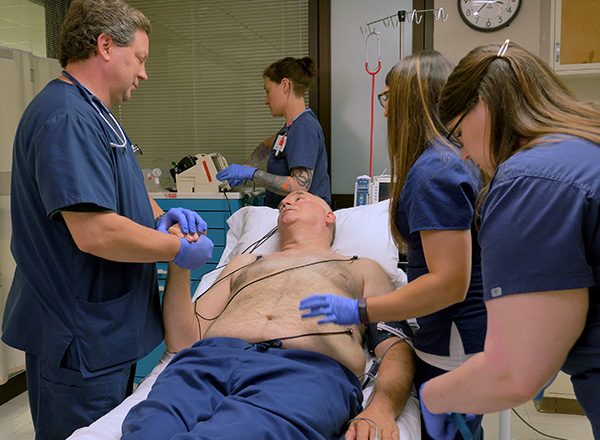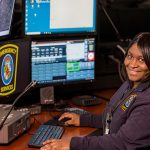For over three decades, Michael Lovelace, RN, CEN, CFRN, CCEMTP, NREMTP, EMTP-T, has trained colleagues in high-quality CPR and nearly twenty of those years have been spent in the Emergency Department of the University of Alabama at Birmingham Hospital (“UAB”) as an emergency room nurse and nurse educator. With an extensive background as a paramedic, trauma, and in emergency medicine, Michael knew the CPR skills imparted to his colleagues would enable them with the potential to save a patient’s life.
When UAB adopted the Resuscitation Quality Improvement (RQI) program in June 2015, the hospital became the first facility in Alabama and fifth in the country to acquire the technology. Impressed by the life-like simulation, Michael was thrilled to introduce the program to his colleagues. “The machine measures variables such as depth of the CPR compression, the rate and the recoil, and the learner can see on the screen whether they are reaching the appropriate benchmarks in these areas.”
Michael Lovelace, RN, CEN, CFRN, CCEMTP, NREMTP, EMTP-T, nurse educator for University of Alabama at Birmingham Hospital, shares how colleagues used RQI-honed skills when he entered cardiac arrest.
In Denial
By April 2017, the RQI program was well-established with UAB clinical staff in the hospital’s emergency department. On April 13th, Michael arrived at his office and was preparing to head for the hospital’s clinical classroom. As he began walking, he started to have great difficulty in breathing and realized he was sweating profusely. Initially, Michael dismissed his symptoms, “I figured I was just overweight and out of shape, [so I] sat under the air conditioning thinking it would go away.”
As the symptoms worsened, Michael became concerned, but was in denial that he was experiencing a serious cardiac issue. For peace of mind, he drove across the hospital’s campus to the Emergency Department and headed directly to the trauma unit. Michael asked a colleague to perform an electrocardiogram test and ensure nothing serious was occurring.
Expecting the Worse
The following moments filled Michael with shock and fear. The ECG indicated Michael was experiencing a massive heart attack. As his colleagues rushed him to the hospital’s cardiac catheterization lab, Michael lifted his arm and grabbed the hand of one of his colleagues. Thinking he was going to die, he began frantically telling his passwords and lock combinations to a fellow nurse and prayed with the hospital chaplain, “I told them I was scared to death and then at that point, I just drifted off to sleep,” Michael remembered.
After losing consciousness, Michael entered cardiac arrest. His colleagues proceeded to perform CPR for 18 minutes and provided four shocks with a defibrillator. After his heart returned to a normal rhythm, Michael’s care team inserted two stents to reopen his blocked right coronary artery. The entire incident, from when he began experiencing symptoms to when he received his stents, occurred in less than an hour. Michael sustained no lingering brain or neurological damage, and after two months of cardiac rehabilitation, returned to work.
Lifelong Gratitude
He fully credits his survival to the skills his colleagues learned through the RQI program, “They broke 11 ribs, but it was good CPR because I’m here to tell the story.” He continued, “The skills he produced on that day helped save my life.”
“I’m proof that if you do high-quality CPR, you have a much better chance at a successful outcome.”
Michael incorporates his experience into the clinical education program for UAB colleagues, presenting his cardiac arrest as a case study, only revealing at the end that he was the patient who survived. He reflected, “I’m proof that if you do high-quality CPR, you have a much better chance at a successful outcome. I’m thankful for every day, because every day is a day I wouldn’t have had if my colleagues didn’t do what they did.”









